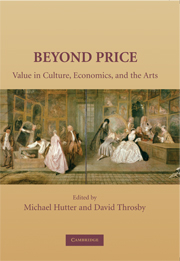Book contents
- Frontmatter
- Contents
- List of Contributors
- Preface
- 1 Value and Valuation in Art and Culture: Introduction and Overview
- PART ONE ORIGINS OF MEANING
- PART TWO THE CREATION OF VALUE IN ARTISTIC WORK
- PART THREE CONTINUITY AND INNOVATION
- PART FOUR APPRECIATION AND RANKING
- PART FIVE CULTURAL POLICIES
- 15 What Values Should Count in the Arts? The Tension between Economic Effects and Cultural Value
- 16 The Public Value of Controversial Art: The Case of the Sensation Exhibit
- 17 Going to Extremes: Commercial and Nonprofit Valuation in the U.S. Arts System
- Index
- Plate section
- Plate section
- References
17 - Going to Extremes: Commercial and Nonprofit Valuation in the U.S. Arts System
from PART FIVE - CULTURAL POLICIES
- Frontmatter
- Contents
- List of Contributors
- Preface
- 1 Value and Valuation in Art and Culture: Introduction and Overview
- PART ONE ORIGINS OF MEANING
- PART TWO THE CREATION OF VALUE IN ARTISTIC WORK
- PART THREE CONTINUITY AND INNOVATION
- PART FOUR APPRECIATION AND RANKING
- PART FIVE CULTURAL POLICIES
- 15 What Values Should Count in the Arts? The Tension between Economic Effects and Cultural Value
- 16 The Public Value of Controversial Art: The Case of the Sensation Exhibit
- 17 Going to Extremes: Commercial and Nonprofit Valuation in the U.S. Arts System
- Index
- Plate section
- Plate section
- References
Summary
The complex U.S. arts system is viewed with curiosity and at times even with admiration. But absent a ministry of culture or similar central cultural authority, the United States has unwittingly advanced concepts of value that poorly engage the larger public purpose. From the perspective of an arts-management insider, valuation today resides in either the popular or the precious. However, one view overstates the significance of art as asset and commodity, and the other overstates the importance of the supply-side desires of refined arts elites. “Art-as-commodity” in the arts industries, and the “art-is-what-you-need-even-if-you-don't-want-it” view in the nonprofit arts, have generated unhelpful practices while raising thorny public policy questions. To illuminate specific problems and outline possible solutions, we must engage in a kind of reverse engineering, looking to the development of U.S. for-profit and nonprofit arts industries for factors that shape divergent definitions of value. To the extent that trade in U.S. arts products has spread the model of copyright-protected revenue streams around the world, and to the degree that countries with strong traditions of government support for culture seek to emulate U.S. cultural philanthropy, the unique challenges posed by commercial and nonprofit valuation in the U.S. arts system are object lessons of global significance.
Value in the for-profit arts
The 2004 merger between Sony Music and BMG has, among other things, put the two most consequential archives of recorded American music and spoken word assembled during the twentieth century under the ownership of a single, non-U.S. corporation.
- Type
- Chapter
- Information
- Beyond PriceValue in Culture, Economics, and the Arts, pp. 283 - 298Publisher: Cambridge University PressPrint publication year: 2007



